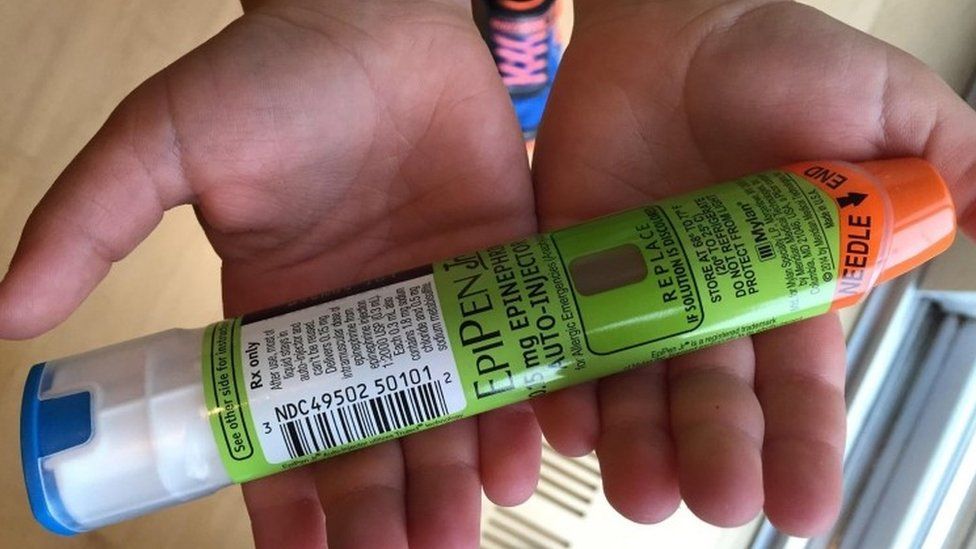ARTICLE AD BOX
 Image source, AFP
Image source, AFP
Adrenaline auto-injectors are commonly known as EpiPens
Only 60% of patients who have had hospital treatment for food anaphylaxis were prescribed medicine to tackle another reaction, a study has found.
The study of some 130,000 NHS records where food allergy was mentioned showed 3,589 patients received "unplanned hospital treatment" for anaphylaxis.
Of those, only 2,152 were prescribed adrenaline auto-injectors (AAI) at least once.
Two leading allergy specialists have produced guidance to raise awareness.
Clinical scientist Dr Paul Turner from the National Heart & Lung Institute at Imperial College London, who carried out the study, and Prof Adam Fox, consultant paediatric allergist at Evelina London Children's Hospital, said they hoped the leaflet they have produced would save lives.
It is designed to help patients, parents, families, grandparents, friends and nannies so they feel empowered and more confident when looking after a person with food allergies.
Anaphylaxis is a severe, potentially life-threatening allergic reaction that can develop rapidly.
Early signs of anaphylaxis include itchy skin or a raised red skin rash. swollen eyes, lips, hands and feet.
If used early in the course of a severe reaction, an AAI - commonly known as an EpiPen - can make a quick recovery more likely.
Image source, Getty Images
Image caption,Fatal reactions to food are "incredibly rare"
Dr Turner and his colleagues at the National Heart & Lung Institute studied 130,832 patient records from all visits to NHS facilities including general practices and accident and emergency wards from 2008 to 2018.
Of the patient records they studied, 45% were of men and the median age was 19.
- 30,911 (23.6%) had at least one AAI prescribed
- 3,589 (2.7%) were coded as having had an unplanned hospital visit due to food anaphylaxis
- Of those, 41% had a repeat prescription for an AAI
- Children were 63% more likely to have a repeat prescriptions than adults
Reuben has had four anaphylaxis episodes
Reuben's story
Karina's 10-year-old son Reuben is allergic to peanuts, tree nuts, sesame seeds, fish and shellfish and was diagnosed with a milk allergy at four months old.
He has had an anaphylactic reaction four times, the first being when he tried salmon when he was seven months old.
"He immediately started wheezing, having breathing difficulties and was covered in a rash. We didn't know it was anaphylaxis but we took him to A&E," Karina said.
"At the time it's dramatic. You don't really know what's going to happen and not being a medic myself, a lot of things were beyond my knowledge.
"I just wanted to wrap him up in cotton wool and never go home again, but I know that if we don't start going back home and doing the things that we enjoy, it makes the fear grow more and then your world shrinks and then you're not living your life.
"We don't want that for Reuben; we want Reuben to live as full a life as possible."
Prof Fox is often asked to be an expert witness at inquests involving the deaths of people who have died from an allergic reaction to food.
He said there was usually a "strong case that the things that went wrong were avoidable".
"It seems to be the same things that we are coming across, and I feel very strongly after one of the more recent ones that I did, that I wanted to know for sure that all of my patients were hearing all of these key messages so that they can empower themselves to reduce the risk of having severe reactions."
After the last inquest he contributed to, he said he went home and wrote down on two sides of A4 paper what the most important messages were.
That has now turned into a leaflet for health practitioners and those with food allergies, to provide an overview of the things they need to know if someone is at risk of anaphylaxis.
"This leaflet is all about raising public awareness, so that people know about identifying and treating allergic reactions early," he said.
Prof Adam Fox said he hoped the leaflet would relieve families of anxiety around food allergies
He said the most important elements were:
- Make sure those that need AAIs always have access to them, ideally more than one pen
- Ensure they know how and when to use it - don't delay. Quite often people wait too long and if AAIs are not used early enough then their potential benefit is lost
- Have an allergy action plan
- If the person with allergies has asthma, make sure it is well controlled
"Thankfully, really severe reactions are very rare," he added.
"With the right sort of sensible precautions; paying attention to food labelling, making sure you carry your adrenalin everywhere with you, you'll be fine."
He added: "In my experience of many families with a child that has a food allergy, the whole family lives with an enormous amount of anxiety because of concern about possible fatal reactions when in fact those are incredibly rare.
"What this leaflet is all about is trying to relieve that anxiety and show that by following a few simple rules, life can potentially be a lot better and less restricted."
Additional reporting by Rebecca Cafe
Listen to the best of BBC Radio London on Sounds and follow BBC London on Facebook, X and Instagram. Send your story ideas to hello.bbclondon@bbc.co.uk
Related Internet Links
The BBC is not responsible for the content of external sites.

 1 year ago
38
1 year ago
38








 English (US) ·
English (US) ·